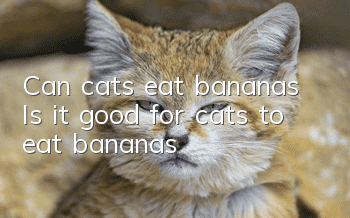Can cats eat bananas? Is it good for cats to eat bananas?

If your cat likes the taste of banana, then this is good for your cat’s health. That doesn't mean bananas are unhealthy for cats, but it doesn't mean it has great nutritional value either. However, there are some nutrients in bananas that are beneficial to cats.
Potassium
Banana is rich in potassium. This is a nutrient that helps with heart and kidney health. Potassium is essential for older cats because mature cats have weaker hearts and may develop chronic kidney failure as they age. Giving your cat potassium is a balancing act. First, a good cat food should contain the balance of vitamins and minerals your cat needs. Daily potassium intake should only make up 0.6% of your cat's daily diet, however, if you feel you need additional potassium then you should seek veterinary advice.
If a cat has low levels of potassium in its blood, it can develop hypokalemia. This means the levels of potassium in the blood are low. In mild cases, you usually won't notice low potassium levels. Low levels of potassium in the blood can lead to kidney failure, your cat will lose their appetite, and their limbs will become weak or appear stiff when moving. Feeding moderate amounts of bananas occasionally may help, but be sure to check with your veterinarian before changing their diet.
Vitamin B6
The vitamin B6 found in bananas has a great promotion effect on old cats. Vitamin B6 is particularly important for kidney function and is eliminated in the urine throughout the day. Therefore, it must be replaced. Don't rely on bananas to get vitamin B6, as cats need to eat more bananas than is safe to get a sufficient, required dose. This is a helpful supplement if your cat also likes the taste.
Manganese
One trace mineral found in bananas is manganese. Manganese is good for the skin because it promotes collagen production. This is necessary for older cats because their skin is fragile and they may develop scabs and ulcers on their body and head. Cats require small amounts of manganese to meet their daily needs, but manganese deficiencies are rare. There is no harm in adding bananas to the diet, so a small slice of banana can add more manganese to your cat's diet.
Digestive health
Bananas are rich in fiber, which can cause diarrhea if eaten in large amounts. If your cat is constipated, it may be beneficial to eat bananas. Using a small amount of mashed banana with a little water, mixed with food or eaten alone, can help with constipation. Make sure your cat has access to the litter tray or can go outside. Are there any harm in feeding bananas to cats? Cats are carnivores, so they get their nutrients primarily from the meat of other animals, such as chicken or beef.
However, bananas are delicious, filling and rich in nutrients for us humans, including fiber and potassium. Sounds perfect for a feline friend, doesn’t it? However, are bananas as good for cats as they are for us humans?
Can cats eat bananas?
Bananas are not on the list of foods that are toxic to cats, so they are safe for cats to eat in moderation. Remember, bananas are high in sugar, calories, and fiber, so if your cat isn't interested in sweets, they may not be interested in tasting them.
What are the benefits of cats eating bananas?
As mentioned above, bananas are not toxic to cats. Although there are many advantages to feeding bananas to cats, there are also some disadvantages. These include:
Sugar: Bananas contain an average of 17 grams of natural sugar. Feeding your cat too much sugary food may lead to obesity, ultimately leading to unnecessary joint strain and potential arthritis - which is common in older cats. But young cats can also develop arthritis. If you notice that your cat is weighing a little more than normal, then you'll have to recheck your cat's calorie intake. Obesity increases a cat's risk of developing diabetes. Normally, more weight in cats can lead to diabetes and other health problems. Finally, too much sugar can take a toll on your cat’s teeth. Dental disease is a common problem in older cats. A low-sugar diet can reduce the chance of plaque forming on your cat's teeth.
Fiber: Fiber helps the digestive tract manage food and eliminate it from the body as healthy waste. Bananas are high in fiber, so in theory, they make a great cat food. In practice, however, it's easy for cats to have too many. A cat who is fed a high-quality, balanced diet will get all the fiber he needs, but adding too much of these foods can cause digestive disorders that, if left untreated, can lead to diarrhea and dehydration in cats. Cats take a long time to digest fiber. Sure, the cat will feel full longer and so won't bother you with extra food or treats. On the negative side, digestion will be much slower and the cat may feel bloated.
Carbohydrates: Like fiber, carbohydrates are one of the major food groups. For cats, carbohydrates are not actually needed. Too many carbohydrates for a cat are extra calories that, if not burned, can lead to obesity.
How to safely give bananas to cats?
It is safe to feed bananas to cats, but be careful when introducing new foods. You should first give your cat a small piece to see if he likes bananas. Giving your cat a small piece of meat can tell you whether your cat can tolerate the food without causing an upset stomach. Never feed your cat moldy bananas as these mayCause indigestion. Never give peel to cats - it's difficult to chew, and even if they manage to chew a small piece, it can easily become a choking hazard.
- Why do cats have the instinct to catch mice? It turns out that’s the reason!
- What should I do if my British shorthair cat develops catnip?
- What to do if a kitten has lice? Cut off the source of infection to the cat
- Can cephalosporin anti-inflammatory drugs treat nasal congestion in cats? Are they useful?
- What is better for Himalayan cats to eat?
- At what age can a cat eat cat grass? How often is it appropriate to eat cat grass?
- What is the best food for Isle of Man tailless cats?
- Ten food taboos that cats should not eat
- Which cat is the best to keep? Is your cat on the list?
- Will a female cat’s milk engorgement subside on its own?



